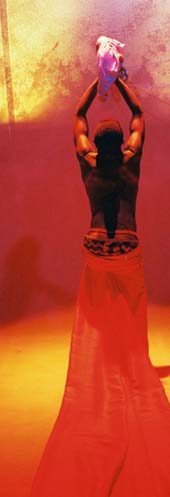blood.claat - to June 9 at the Firehall

"This is my story", the spirited young woman sings in her backyard, by the cinder blocks and corrugated tin walls.
She's washing the blood from between her legs with a cloth, and happy because she'll soon be heading off for netball practice before school. "I have gold trophies on my mind/woopsie all the time", she sings. The fact that she's washing away blood is essential, because this is a story about the power of blood: the blood of creation, and the blood of destruction.
Given the topic, it's a good thing we have mudgu (d'bi.young.anitafrika) to guide us, with her energetic dancing and singing, her good humour, and a spirit of rebellion. Her mother lives in "foreign" (also known as Canada) a land mudgu characterizes as a place with tampons and no lineups. Here in Jamaica, she is brought up by her granny, and about to findout that both creation and destruction are in her blood.
As a young woman, mudgu is getting conflicting messages about menstruation. Her granny and auntie think it's dirty and "all nasty", and mudgu admits herself that she sometimes looks "as if someone got shot or cut up." Her boyfriend njoni doesn't want her in the house when she has her period, telling her she can't touch anything - his clothes and possessions he refers to as "the kingdom things." When mudgu remembers the stories her mother used to tell her, she is reminded that female blood has the power of creation. Her Jamaican life shows her that male power (including religious power) spills blood of a different kind.
Throughout the play, we return again and again to a bloody cloth in a round basin of water, which is sometimes lit with a red light that drips off mudgu's hands. The blood from her body, the blood from a machete attack on the bus, the blood from a drug world killing - all is absorbed by cloth and ends up in this basin: the circle around which the play turns.
As a fairly straight-forward one-woman play, d'bi.young.anitafrika plays all the characters, and her transformations are certainly effective. My particular favourites were the crotch-grabbing, oh-so-sure-of-himself njoni, and mudgu's praise-Jesus auntie, with a wriggle of joy for the Lord in her hips. A clothesline slanted the depth of thestage, a clever place to put the props needed to signal a change in character: a hat and bible for the auntie, a cigarette for the tough-talking granny.
The danger in one-person plays is that it becomes an opportunity to gape at an actor's technical skill. Much better is when that skill is subverted to the needs of a fine story. Despite d'bi.young.anitafrika's obvious talent and energy on stage in this fast-paced show, some of the most convincing moments for me came when she played mudgu's mother, pitched low and simply delivered, just sitting on a stool telling the audience (as mudgu) a story.
The name of the play, blood.claat, is apparently a swear-word in Jamaica, but also refers to the cloth women used to wear when menstruating, and a blood "clot" used in healing. The name links us to another part of the play's story - an older story, about slavery and resistance to slavery; a story about mudgu's ancestors and ancient traditions. What the term blood.claat means, both now and in the past, and the blood magic African women used to perform, are important keys to understanding the second story, but unfortunately I wasn't able to follow them on stage. There were very few scenes in the work that introduced this other level. The historical scenes that did exist featured human and mythological characters that are clearly the stuff of legend, but with which I wasn't familiar. I didn't know there ever was a slave rebellion in 18th Century Jamaica, and that a woman was a rebellion leader. I found that out from reading notes afterwards, not from the play itself, although the rebellion's leader is a character in the play. Even with that background now, I'mstill unsure how mudgu's modern story related to the story of her female ancestors.
I don't mind puzzling out the meaning of a play after I go home, and often find it's a sign of a rewarding piece of theatre. But in the case of blood.claat, it felt like there was a wonderfully thick layer if ideas and meaning and imagery that I wasn't able to access at all during the show because I simply wasn't following the story. My confusion during the performance meant I lost the chance to achieve a shared understanding with the rest of the audience, together in the same hall, at the same time. Achieving that understanding, simultaneously, is one of the things that can make theatre so powerful. Being left to drift in my own, separate understanding, instead feels like the wrong kind of ending for a story about the shared power of blood.
_A Magnetic North Theatre Festival presentation. Theatre Passe Muraille: blood.claat. Written by d'bi.young.anitafrika. Directed/dramaturged by Weyni Mengesha. Music composed by Amina Alfred. Original choreography by Learie McNicolls and Byron Beckford. Performed by d'bi.young.anitafrika. Firehall Arts Centre, June 4-9, 2008._



